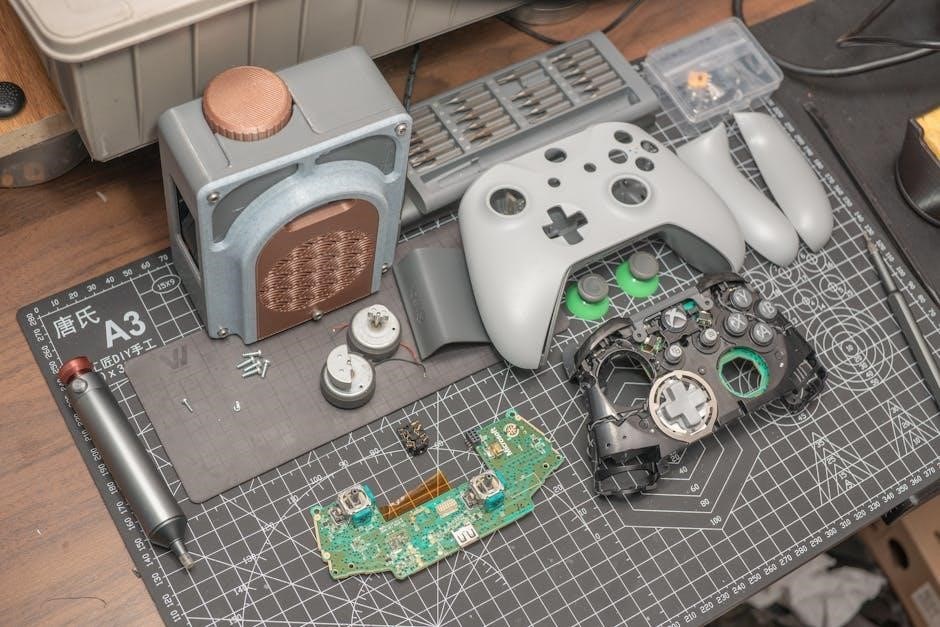Service Desk technical interviews evaluate candidates’ problem-solving skills, technical knowledge, and customer service abilities. They are crucial for assessing suitability for support roles in IT environments.
1.1 What is a Service Desk?
A Service Desk is a centralized point of contact within an organization that provides technical support and assistance to users. It serves as the primary interface for addressing hardware, software, and network-related issues. The Service Desk ensures efficient incident management, troubleshooting, and resolution of technical problems. It also handles service requests, such as password resets or software installations. The role of a Service Desk is critical in maintaining smooth IT operations and ensuring user productivity. By acting as a single point of contact, it streamlines communication and resolves issues promptly, enhancing overall customer satisfaction.
1.2 Importance of Technical Interviews in Service Desk Roles
Technical interviews are crucial for evaluating candidates’ suitability for Service Desk roles. They assess problem-solving skills, technical knowledge, and the ability to troubleshoot common IT issues. These interviews help employers determine how well a candidate can handle real-world scenarios, ensuring they can provide effective support. By focusing on practical questions, technical interviews reveal a candidate’s ability to resolve hardware, software, and network problems efficiently. They also evaluate communication skills, as clear explanations are essential for customer satisfaction. Ultimately, technical interviews ensure that candidates possess the skills and mindset required to excel in a fast-paced Service Desk environment, where quick and accurate problem resolution is critical.
1.3 Key Skills Assessed in Service Desk Interviews
In Service Desk interviews, key skills such as technical knowledge, problem-solving, and communication are assessed. Employers evaluate candidates’ ability to troubleshoot hardware, software, and network issues. Strong customer service skills are essential, as Service Desk roles require patient and clear interactions with users; Adaptability and time management are also critical, as technicians often handle multiple tickets and prioritize tasks effectively. Interviewers may ask scenario-based questions to gauge how candidates handle difficult customers or resolve complex technical problems. Additionally, familiarity with IT frameworks like ITIL and experience with ticketing systems are often evaluated. These skills ensure candidates can provide efficient and effective support in a dynamic environment.

Common Service Desk Technical Interview Questions
Interviews often include behavioral, technical, and scenario-based questions, such as discussing strengths, technical knowledge, and handling difficult customers, with tips on preparation provided.
2.1 Behavioral Questions
Behavioral questions in Service Desk interviews focus on assessing soft skills and past experiences. Common examples include discussing strengths and weaknesses, handling difficult customers, and teamwork. Candidates are often asked to describe situations where they went above and beyond for customers or colleagues, demonstrating adaptability and problem-solving; These questions help employers gauge how well candidates align with company values and customer service standards.Preparation involves reviewing past experiences and practicing responses that highlight transferable skills, ensuring confidence during the interview.
2.2 Technical Questions
Technical questions in Service Desk interviews assess a candidate’s IT knowledge and problem-solving abilities. Common topics include IT fundamentals, networking basics, operating systems, hardware troubleshooting, and software applications. Questions may cover DNS, Active Directory, and ticketing systems like Jira or ServiceNow. Employers evaluate how well candidates understand technical concepts and can apply them to real-world scenarios. These questions also test familiarity with tools and processes, ensuring the candidate can handle typical Service Desk tasks. Preparation involves reviewing technical documentation and practicing explanations of complex systems in simple terms. Demonstrating confidence and clarity in addressing these questions is crucial for success.
2.3 Scenario-Based Questions
Scenario-based questions simulate real-world challenges, testing how candidates handle situations like difficult customers or technical issues. Examples include resolving a slow computer, managing multiple tickets, or addressing user complaints. These questions assess problem-solving skills, customer service abilities, and decision-making under pressure. Employers evaluate how well candidates prioritize tasks, communicate solutions, and maintain professionalism. Common scenarios also involve troubleshooting network issues or explaining technical concepts to non-technical users. Demonstrating calmness, clarity, and a customer-focused approach is key. These questions help employers gauge a candidate’s readiness to handle the daily demands of a Service Desk role effectively and efficiently.

Behavioral Interview Questions and Answers
Behavioral questions focus on assessing candidates’ past experiences, strengths, weaknesses, and teamwork skills. They help employers understand how candidates handle challenges and provide customer service effectively. These insights reveal how well candidates align with the Service Desk role and company culture, ensuring a good fit for the position.
3.1 Strengths and Weaknesses
When discussing strengths, emphasize technical proficiency, problem-solving abilities, and customer service skills. For weaknesses, acknowledge areas like delegation or time management, showcasing how you address them. Be honest and highlight self-improvement efforts, demonstrating self-awareness and growth. This balance shows maturity and readiness for the Service Desk role. Examples include strengths like quick troubleshooting and weaknesses like needing to improve documentation habits. Always frame weaknesses positively, focusing on ongoing development rather than flaws. This approach helps build trust and confidence in your candidacy, aligning with the expectations of a Service Desk professional.
3.2 Past Experiences and Challenges
Highlighting past experiences and challenges demonstrates your problem-solving skills and adaptability. Discuss specific incidents, such as resolving a complex technical issue or managing a difficult customer. Emphasize how you approached the problem, the steps you took, and the outcome. For example, describe a time when you troubleshooted a network issue or handled a high-volume of tickets efficiently. Be clear about your role and how your actions contributed to the resolution. This showcases your ability to work under pressure and deliver results. Additionally, mention any lessons learned, such as improving communication or time management, to illustrate personal and professional growth. This helps interviewers understand your capability to handle Service Desk challenges effectively.
3.3 Teamwork and Customer Service Skills
Teamwork and customer service skills are essential for success in a Service Desk role. Highlight experiences where you collaborated with colleagues to resolve issues or improve processes. Describe situations where you provided exceptional customer service, such as assisting a frustrated user or resolving a recurring problem. Emphasize your ability to communicate clearly, remain patient, and prioritize user satisfaction. For example, mention a time when you worked with a team to implement a new ticketing system or helped a difficult customer by listening to their concerns and providing a tailored solution. These examples demonstrate your ability to work effectively in a team and deliver outstanding customer service, aligning with the core requirements of a Service Desk position.

Technical Interview Questions and Answers
Technical interviews assess IT knowledge, troubleshooting skills, and problem-solving abilities. Prepare for questions on IT fundamentals, networking, operating systems, and hardware. Practice answering scenario-based technical queries confidently.
4.1 IT Fundamentals
IT fundamentals are core to service desk roles, covering basic concepts like hardware, software, and networking. Candidates should understand operating systems, cloud basics, and essential security practices. Familiarity with ticketing systems and ITIL frameworks is also crucial. Be prepared to explain common troubleshooting steps and diagnostic tools. Interviewers often ask about BIOS, DNS, and Active Directory. Demonstrating a clear understanding of these areas shows a strong foundation for technical support roles. Reviewing these topics ensures readiness for fundamental technical questions, which are often the starting point in service desk interviews.
4.2 Networking Basics
Networking basics are essential for service desk roles, as they often involve troubleshooting connectivity issues. Key topics include IP addresses, DNS, DHCP, and network topologies like LAN, WAN, and Wi-Fi. Candidates should understand how devices communicate over a network and be familiar with common protocols. Troubleshooting skills, such as identifying cable issues or misconfigured IP settings, are frequently tested. Questions may also cover router and switch functionality. Practical examples, like explaining how DNS resolves hostnames to IP addresses, demonstrate a clear grasp of networking fundamentals. These concepts are critical for diagnosing and resolving common network-related problems, making them a focus in technical interviews.
4.3 Operating Systems and Software
Operating systems and software are critical areas in service desk technical interviews. Candidates are often asked about their familiarity with Windows, macOS, and Linux systems, including installation, configuration, and troubleshooting. Knowledge of software applications, such as Microsoft Office, antivirus programs, and remote desktop tools, is also essential. Interviewers may inquire about common issues like compatibility problems or software updates. Understanding how to diagnose and resolve errors, such as system crashes or application freezes, is vital. Additionally, questions may cover best practices for reinstalling software or performing system restores. Proficiency in these areas demonstrates a candidate’s ability to provide effective support for a wide range of technical issues.

4.4 Hardware and Troubleshooting
Hardware and troubleshooting are key areas in service desk interviews, focusing on diagnosing and resolving physical device issues. Common questions involve identifying and repairing hardware components like RAM, GPUs, and motherboards. Interviewers may ask about troubleshooting techniques for common problems, such as faulty peripherals or network connectivity issues. Candidates should demonstrate knowledge of diagnostic tools and methodologies, such as checking event logs or running hardware tests. Understanding how to perform basic repairs, like replacing a hard drive or configuring BIOS settings, is also essential. Effective hardware troubleshooting skills are crucial for providing timely and efficient support, ensuring minimal downtime for users.

Scenario-Based Interview Questions and Answers
Scenario-based questions test your ability to handle real-world situations, such as managing difficult customers, troubleshooting common issues, and prioritizing multiple tasks effectively in a service desk environment.
5.1 Handling Difficult Customers
Handling difficult customers is a common scenario in service desk roles. Employers want to assess your patience, empathy, and problem-solving skills; Common questions include, “Tell me about a time you dealt with an angry customer” or “How would you handle a user who refuses to follow your instructions?” When answering, emphasize staying calm, actively listening, and focusing on resolving the issue. Highlight your ability to de-escalate tensions and provide clear, concise solutions. Demonstrating professionalism and customer-centric behavior is key. For example, explain how you acknowledged the customer’s frustration, offered a solution, and ensured their satisfaction. Showcasing these skills will help you stand out as a strong candidate.
5.2 Troubleshooting Common Issues
Troubleshooting common issues is a critical skill for service desk roles. Interviewers often present scenarios like a slow computer or network connectivity problems. They assess your ability to identify root causes and implement effective solutions. When answering, demonstrate a systematic approach: gather information, isolate the issue, test solutions, and document outcomes. For example, if asked about a slow computer, explain how you’d check for malware, disk space, or software updates. Emphasize clear communication and efficiency in resolving issues. Highlighting your ability to use diagnostic tools and follow ITIL best practices will showcase your technical expertise and problem-solving capabilities, making you a strong candidate for the role.

5.3 Managing Multiple Tickets and Priorities
Managing multiple tickets and priorities is essential in a service desk environment. Interviewers may ask how you handle simultaneous tasks and prioritize them effectively. Explain your approach using frameworks like ITIL or personal strategies. Describe how you categorize tickets by urgency and impact, ensuring critical issues are resolved promptly. Mention tools like ticketing systems that help organize and track progress. Highlight your ability to maintain focus and meet deadlines while providing updates to customers. Emphasize clear communication and time management skills, demonstrating how you balance efficiency with thoroughness. This showcases your capability to manage workload effectively and maintain customer satisfaction in a fast-paced setting, aligning with service desk expectations.

Tips for Preparing for a Service Desk Interview
Researching the company, practicing common responses, and understanding the job description are key tips for preparing for a service desk interview. Focus on technical skills, customer service scenarios, and time management techniques to ensure confidence and readiness.
6.1 Researching the Company
Researching the company is a critical step in preparing for a service desk interview. Understanding the organization’s mission, values, and products helps align your skills and experiences with their needs. Familiarize yourself with their service desk operations, company culture, and customer expectations. Reviewing recent news or updates about the company demonstrates initiative and genuine interest. This knowledge enables you to tailor your responses, showcasing how your background and abilities can contribute to their success. Additionally, understanding the company’s industry and challenges allows you to ask informed questions during the interview, highlighting your engagement and readiness to adapt to their environment.
6.2 Practicing Common Responses
Practicing common responses is essential for acing a service desk interview. Review frequently asked questions, such as behavioral, technical, and scenario-based queries, and prepare thoughtful answers. Use the STAR method (Situation, Task, Action, Result) to structure your responses clearly. Focus on showcasing your problem-solving skills, customer service abilities, and technical knowledge. Tailor your answers to align with the company’s values and job requirements. Practice articulating your strengths, weaknesses, and past experiences confidently. Mock interviews or speaking with industry professionals can help refine your delivery. The goal is to ensure your responses are concise, professional, and demonstrate your readiness for the role. Regular practice builds confidence and reduces nervousness during the actual interview.
6.3 Understanding the Job Description
Understanding the job description is crucial for a successful service desk interview. Analyze the key responsibilities, required skills, and qualifications listed in the job posting. This helps you align your experiences and skills with what the employer is seeking. Identify specific keywords and themes, such as technical expertise, customer service, or problem-solving, and prepare examples from your past roles that demonstrate these qualities. Research the company culture to tailor your responses accordingly. By thoroughly understanding the job description, you can show the interviewer how you fit the role and meet their expectations. This preparation also helps you ask informed questions during the interview, showcasing your genuine interest in the position.

Advanced Topics in Service Desk Interviews
Advanced topics include automation tools, AI integration, and ITIL best practices, focusing on optimizing service delivery, enhancing efficiency, and improving customer satisfaction through modern technologies.
7.1 Automation and AI in Service Desks
Automation and AI are transforming service desks by streamlining ticket resolution and enhancing efficiency. Chatbots powered by AI handle routine inquiries, freeing human agents for complex issues. Machine learning algorithms analyze historical data to predict and resolve problems proactively. Automated workflows reduce manual tasks, ensuring faster response times. Implementing these technologies requires understanding their integration with existing systems and their impact on customer interactions. Candidates should demonstrate knowledge of AI-driven tools and how they improve service delivery, accuracy, and user satisfaction.
7.2 Advanced Troubleshooting Techniques
Advanced troubleshooting techniques involve systematic approaches to identify and resolve complex technical issues efficiently. These methods often include root cause analysis, logical fault isolation, and the use of specialized tools. Candidates are expected to demonstrate proficiency in diagnosing issues across multiple systems and platforms, leveraging methodologies like the OSI model or the 6-step troubleshooting process. Knowledge of advanced diagnostic tools, such as network packet analyzers or system monitoring software, is crucial. Additionally, understanding how to apply ITIL best practices to incident management can showcase a candidate’s ability to align technical skills with operational efficiency, ensuring minimal downtime and faster resolution times.
7.3 ITIL Framework and Best Practices
The ITIL (Information Technology Infrastructure Library) framework is a cornerstone of modern IT service management, emphasizing alignment of IT services with business objectives. It provides best practices for delivering high-quality services through structured processes. In service desk roles, understanding ITIL principles is crucial for managing incidents, problems, and changes effectively. Candidates are often assessed on their knowledge of ITIL’s service lifecycle, including Service Strategy, Design, Transition, Operation, and Continual Service Improvement. Proficiency in ITIL’s incident, problem, and change management processes is essential for resolving issues efficiently and maintaining customer satisfaction. Familiarity with ITIL certification or practical application in real-world scenarios is highly valued during interviews.

Final Tips and Tricks
- Stay calm, confident, and prepared for your interview.
- Research the company to align your skills with their needs.
- Practice answering common questions with clarity and precision.
- Highlight transferable skills and relevant experiences.
- Follow up with a thank-you note to express gratitude.
8.1 Staying Calm and Confident
Staying calm and confident during a service desk interview is crucial for making a positive impression. Take deep breaths before answering questions to manage nerves. Prepare thoroughly by practicing common responses to technical and behavioral questions. Maintaining eye contact and using a steady tone of voice demonstrates self-assurance. Remember, confidence showcases your ability to handle the demands of a service desk role effectively. A calm demeanor also reflects your problem-solving skills under pressure. Avoid rushing through answers—pause briefly to gather your thoughts. Highlighting your strengths and past successes can boost your confidence naturally. Show enthusiasm for the role and its challenges to convey readiness and professionalism. Confidence and composure are key to acing your interview and securing the position. Stay focused and positive throughout the process.
8.2 Highlighting Transferable Skills
Highlighting transferable skills is essential during a service desk interview. Emphasize abilities like problem-solving, communication, and customer service, which are vital for the role. Even if your experience isn’t directly in IT, showcase skills like troubleshooting, time management, and teamwork. For example, discuss how you handled difficult situations or improved processes in previous roles. Demonstrating adaptability and a willingness to learn can also set you apart. Be specific by linking your skills to scenarios common in service desk environments, such as resolving user issues or managing multiple tasks. This approach shows how your background prepares you for the demands of the job, making you a strong candidate for the position.
8.3 Following Up After the Interview
Following up after a service desk interview is crucial to leave a positive impression. Send a thank-you note within 24 hours, expressing gratitude for the opportunity and reiterating your interest in the role. Mention specific topics discussed during the interview to personalize your message. This demonstrates professionalism and enthusiasm. If you haven’t received feedback within a week, consider sending a polite follow-up email to inquire about the status. Highlighting your eagerness and courtesy can strengthen your candidacy; A well-crafted follow-up not only shows appreciation but also reinforces your suitability for the position, keeping you in the interviewer’s mind during the decision-making process.
Preparing for a service desk technical interview requires a blend of technical knowledge, problem-solving skills, and excellent customer service abilities. By understanding common questions, practicing responses, and staying calm during the interview, candidates can showcase their suitability for the role. The insights provided in this guide, including tips for answering behavioral, technical, and scenario-based questions, are essential for success. Remember, confidence and a thorough understanding of the job requirements will help you stand out in a competitive job market. Use these resources to excel in your interview and take the first step toward a rewarding career in the service desk field. Good luck!
